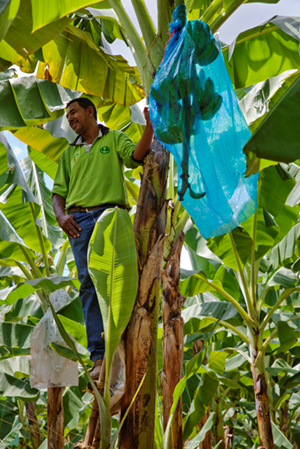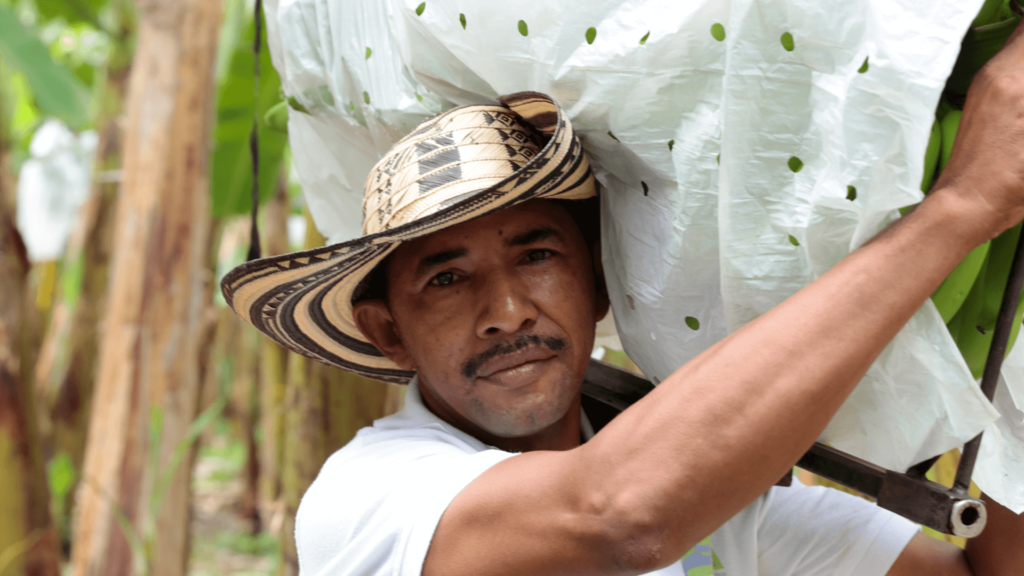Albeiro Alfonso Cantillo, known as Foncho, is a banana farmer from Cienaga, in the banana growing region of Magdalena, northern Colombia.
About Foncho
 Foncho has been a banana farmer for many years, starting when he was 10 years old and helping his father on their small one hectare farm, which he has now inherited.
Foncho has been a banana farmer for many years, starting when he was 10 years old and helping his father on their small one hectare farm, which he has now inherited.
Foncho’s livelihood depends on his bananas so he works hard, putting in long hours to make his business work. He takes his 19-year-old daughter Brenda to university at 5am then goes straight to his farm where he works until 5 or 6pm. He loves spending time with his family – his wife, daughter and their 15-year-old son, Sebastian, who shares Foncho’s passion for football.
Foncho is a member of Coobafrio Co-operative (Riofrio Banana Co-operative) which was set up by his father and 19 other farmers in the late 1990s. Their expectation was that by joining together and selling their bananas as a group they could negotiate better prices with their buyers. The co-op now has 43 members, including 10 women, who employ almost 300 permanent and temporary workers.
Background
The banana industry traditionally provides around 80% of employment in Magdalena but large-scale palm oil plantations are now displacing bananas with the loss of many jobs. Farmers are under constant pressure to sell their land to big business and some unscrupulous landowners are grabbing water resources and diverting water from farmers’ land to force them to sell.
We experienced very difficult times when we weren’t in Fairtrade. It was very worrying to have children and know you couldn’t provide the opportunity for the life they deserve.
Foncho
Farmers face a number of challenges to making a decent living from bananas. The high cost of fertiliser prevents farmers from applying the correct amounts, resulting in low productivity and reduced incomes. Members with larger farms grow other crops to supplement their income and many also have part-time jobs. But around 15% of members have small farms of just 1-3 hectares, and, with no other source of income, struggle to provide for their families.
Farmers often face drought or water shortages and contend with adverse weather conditions, particularly strong winds and heavy rains and floods which damage their crops. They are also affected by the constant revaluation of the national currency, the Colombian peso, and the long-term armed conflict in the region continues to generate a climate of fear and the real threat of extortion by armed criminal gangs.
Fairtrade Partnership
Coobafrio has been Fairtrade certified since 2011. Co-operative members produce around 240,000 boxes or 4,000 tonnes of bananas a year and now sell two-thirds as Fairtrade. Fairtrade sales include a minimum price that covers costs of production and an additional Fairtrade Premium of $1.00 a box to invest in business and community development.
Fairtrade promotes the implementation of modern and sustainable practices and technologies which for Coobafrio has resulted in stronger, long-term business commitments with Uniban, their main trading partner. The increased farmer incomes, generation of employment for local people, and social projects funded by the Fairtrade Premium have all strengthened the standing and credibility of Coobafrio in the local community.
Almost 100% of members report that their quality of life and economic situation has improved because of Fairtrade, and that they have greater control over their futures and those of their families. All members said they now have greater freedom in carrying out their businesses and all have received financial services, technical support and access to fertilisers.
Members’ farms are located in important mountain and lake ecosystems and members consider that compliance with Fairtrade Standards has had a positive impact on the environment, requiring them to protect water sources and use water efficiently, implement reforestation programmes and recycle waste. The decision to end the use of agro-chemicals to protect the environment also has the effect of creating local jobs as more workers are hired to help with manual weeding. Hired workers also benefit from higher wages, provision of personal protective equipment and access to good quality health services.
The most important and effective use of the premium has been the distribution of subsidised fertilisers and the organisation of training programmes to improve farmers’ technical knowledge. These measures have improved the quality of bananas and more than doubled productivity from 15 boxes per hectare to 35 boxes. In financial terms, members report an average 35% increase in incomes since their co-operative was Fairtrade certified.
Other projects funded by the Fairtrade Premium include:
- Funding improvements to meet Fairtrade Standards and compliance with GlobalGap certification which are fundamental to ensuring the quality and competitiveness of Coofabrio’s bananas in international markets.
- Digging and clearing drainage ditches.
- Improvements to banana packing facilities, on-farm irrigation systems and the co-operative office.
- Financial contribution to members’ Social Security payments.
- The Education Fund has helped 82% of members pay for school fees, uniforms, equipment and other costs.
- The Emergency Fund to support members in the event of natural disasters such as flooding, drought and wind damage.
- Small loans to improve farm infrastructure or housing (flooring, sanitation, kitchens and roofing).
- Healthcare projects.
- Community support: irrigation systems; help for elders; paint for the church; school supplies.
